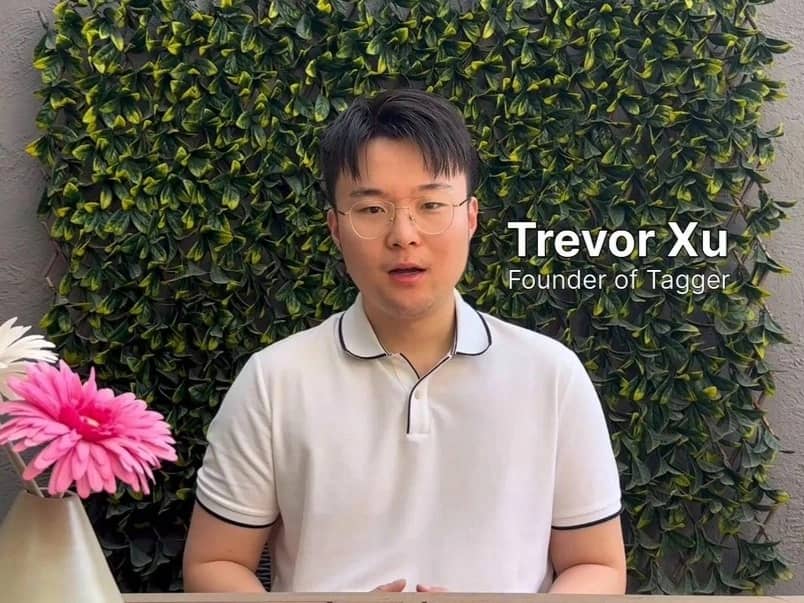Trevor Xu
Trevor Xu is a technology founder known for creating Tagger, a project focused on decentralized data contribution and coordination for artificial intelligence (AI) systems. His work centers on developing blockchain-based solutions to address inefficiencies and inequities in traditional corporate structures and data-collection pipelines for AI development. [1]
Education
Trevor Xu attended the University of Melbourne, where he graduated in 2024 with a degree in Biomedical Engineering. His academic background provided a foundation in technical and analytical disciplines that he would later apply to workflow design and systems engineering in the technology sector. [2]
Career
Xu's career began in 2020 at MarsLadder, where he worked until 2022 in a role focused on product operations and the development of automation tools. During this time, he also engaged in academic instruction as a lecturer for senior mathematics. Concurrently, he contributed to exam development for the First Education Group in Melbourne and co-founded the Perfect Ballers Association, where he supported operational activities. [3]
In 2021, Xu transitioned into the Web3 space by co-founding Singularity Labs, a venture where he focused on project operations until 2023. His experience in this emerging field was complemented by a role from 2022 to 2023 as a CEO assistant at FEDIMOSS in Beijing. There, he was responsible for workflow design and technology analysis, further developing his expertise in optimizing operational processes. [3]
His focus shifted specifically to decentralized AI in 2023 when he co-founded PrismX in Hong Kong, an organization dedicated to building decentralized AI infrastructure. In early 2024, he briefly served as an advisor for Surf Protocol, providing guidance on its derivatives platform. Shortly thereafter, in early 2024, Xu founded Tagger, his primary venture, where he leads the development of decentralized solutions for data processing, authentication, and AI-oriented data markets. [1]
Tagger
Tagger was founded by Trevor Xu in early 2024 as a response to significant inefficiencies within the AI development lifecycle. The project's premise is that a majority of the effort, cost, and time in AI is consumed by data preparation—including collection, cleaning, and labeling—rather than by core model innovation. Tagger aims to replace traditional, centralized data pipelines, which are often slow and costly, with an open, blockchain-based marketplace for data-related work. [1]
Operational Model
The Tagger platform is designed to function as a decentralized ecosystem for data contribution. Its model is built on several key principles to ensure fairness, efficiency, and security.
- Permissionless Contribution: The system allows individuals globally to participate in data tasks without requiring formal approval or traditional employment contracts. This open model is intended to create a large and diverse pool of contributors.
- Data Ownership and Security: Contributors retain ownership of their work. This is facilitated through the use of encrypted storage and on-chain authorization protocols, which ensure that contributors control access to their data.
- Automated Compensation: Payments are handled automatically through smart contracts. Once a task is completed and validated by the network's protocols, compensation is executed directly to the contributor, eliminating intermediaries and payment delays.
The stated benefits of this model include enhanced transparency and accountability, as all transactions and work validations are recorded on the blockchain, and a more equitable distribution of value, shifting economic rewards from centralized entities to the individuals performing the data work. [3]
The #DeCorp Framework
Central to Tagger's operation is a decentralized coordination system that Xu terms "#DeCorp," short for Decentralized Corporation. This framework is designed to replace traditional, hierarchical corporate structures with a protocol-driven system for managing large-scale collaborative work. [4]
Core Components
The #DeCorp model integrates several technologies to facilitate a trustless and efficient work environment:
- Blockchain Foundation: The blockchain acts as the system's foundational layer, providing a transparent and immutable ledger for all task pricing, work records, and financial settlements. This removes the need for trust in a central authority.
- AI-Driven Competency Assessment: The framework utilizes AI tools to assess and standardize the professional skills of contributors. This creates a universal and objective baseline for evaluating qualifications and matching contributors to appropriate tasks.
- AI-Assisted Peer Review: To ensure quality and impartiality at scale, work evaluation is conducted through a system that combines peer review with AI assistance. This mechanism is designed to be scalable for a large number of users while maintaining consistent evaluation standards.
- Smart Contract Automation: Smart contracts are used for the automated execution of cryptographically secure payments. These contracts are triggered once tasks are validated and claimed by contributors, ensuring timely and reliable compensation. [4]
Strategic Goals
The implementation of the #DeCorp framework is intended to achieve several strategic objectives aimed at transforming the nature of collaborative work:
- Higher-Efficiency Organization: By replacing multiple layers of management with AI protocols and transparent incentive structures, the model aims to minimize administrative overhead and decision-making bottlenecks. This encourages contributors to self-organize and operate more efficiently.
- Fairer Wealth Distribution: The system is designed to ensure that value flows directly to the contributors who perform the work. On-chain mechanisms measure contributions and allocate rewards automatically, removing intermediaries that typically absorb a portion of the value created.
- Equal Opportunity and Meritocracy: The framework promotes a merit-based environment where talent is appraised based on AI-assessed performance against transparent criteria. This approach is intended to remove biases related to age, gender, ethnicity, or educational background. A contributor's performance history is recorded as a verifiable and tamper-proof on-chain record, creating a portable professional reputation. In a January 2025 post, Xu stated, "Tagger envisions a world where the only prerequisites for success are one’s genuine skills and willingness to engage—unencumbered by organizational silos or legacy biases."
- Empowerment of Labor: The model offers a flexible participation structure where workers can select tasks from a shared ledger according to their own schedules and locations. This removes the constraints of fixed hours and physical presence, promoting greater autonomy and work-life balance for contributors. [4]
